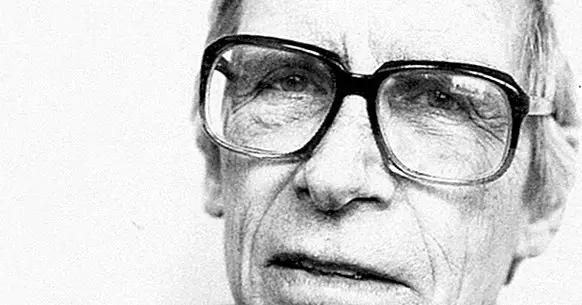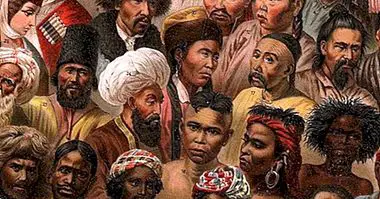The Theory of Justice by John Rawls
Undoubtedly, if there has been a dominant figure in political philosophy during the second half of the twentieth century, that is the figure of John Bordley Rawls (1921 - 2002).
The Theory of Justice by John Rawls , which is also a form of social contract, has been the main form of philosophical foundation of liberalism in its social aspect, as well as a point of reference of compulsory confrontation for other political currents.
The experiment of the "original position"
Rawls's theory of justice, which has at its core the mental experiment of the "original position", exhibited in his magnum opus "A Theory of Justice" (1971), is also a proposal about human subjectivity and the ultimate motives that govern moral behavior.
The mental experiment of the original position aims to ground the basic principles of justice from a reflection that, by hiding certain knowledge about our concrete life circumstances behind a "veil of ignorance", allows us to reflect as free and equal persons on what should be the basic principles of justice .
The influence of Kant's moral imperative
The thought experiment of John Rawls can be traced back to philosophers like Hume or Kant. In fact, there is a clear relationship between the original position and the Kantian moral imperative, since the latter is based on the foundation of moral principles through a reflection based on the rational capacity of the subject, and not in their belonging to a certain group cultural or historical
The difference would be that, while Kant assumes that it is possible to arrive at these principles individually, Rawls raises the original position as a deliberation exercise between people who will occupy different places in society, although at the time of the original position they do not know what those places will be.
Thus, it is not only an abstract deduction of universal moral principles made individually by each person, but is also a form of social contract that lays the foundations of justice and the basic structure of society.
Another difference with Kant would be that, although the former conceived his categorical imperative as a principle to which any rational being can arrive, Rawls rectified his theory later to affirm that his original position is only feasible in historical societies that recognize his principles basic freedom and equality.
- Related article: "Types of philosophy and main currents of thought"
The veil of ignorance
As we have seen, Rawls assumes that people who deliberate in the original position they do not know what position they will occupy in society in the future . They do not know, therefore, what social class they will belong to or what positions of power they will occupy. They also do not know what natural abilities or psychological dispositions they have that could give them an advantage over other people.
In fact, for Rawls, the natural lottery is neither fair nor unfair, but what does have to do with justice is how a society deals with the natural differences between people. Finally, these people know that they will have a certain conception of the good (of what a life must be lived in a meaningful way) that will guide their lives, and that as rational beings they will be able to reconsider and modify with the passage of time.
Contrary to other theories of justice, John Rawls does not presuppose any historically inherited conception of the good that functions as the foundation of justice. If so, the subjects would not be free. For Rawls, the principles of justice are generated in the original position and they are not prior to this. It is the principles arising from the original position that would mark the limits of future conceptions of the good chosen by each person in their concrete life.
Thus, the participants in the original position are conceived as representatives of specific people forced, however, to deliberate under the veil of ignorance .
The participants of the original position experiment
But these subjects are not totally ignorant. They do not know any details of their lives as concrete subjects, but they do they are supposed scientific knowledge about human nature (knowledge of biology, psychology, as well as a presupposition of the validity of neo-classical economic theory) that allows them to know how they will behave in their lives, so that they can negotiate with others on equal terms the best principles in the to substantiate justice.
In addition, these people are presupposed a sense of justice, which means that they want to meet the standards recognized as fair after the negotiation process.
Finally, Rawls presupposes that the subjects of the original position are mutually disinterested, which does not necessarily mean that they are selfish beings, but in the context of the original position his interest is only to negotiate with the limitation of the veil of ignorance in favor of a future concrete person that they represent. Your motivation is this and not the benefit.
The principles of justice
From here, Rawls extracts a series of primary social goods necessary for the development of the "moral powers", the aforementioned sense of justice, as well as the ability to review and pursue a certain conception of the good.
Sayings primary social goods are rights and freedoms , opportunities, income and wealth or the social bases to respect oneself (as an education that prepares us for life in society as well as a minimum income).
Rawls applies the theory of rational choice to the uncertainty conditions of the original position to extract the principles of justice. The first principle that it extracts from the original position is that according to which each person must have the greatest basic freedoms possible to allow the rest of the members of society also have these freedoms. These freedoms are freedom of expression, association or thought. This principle grounds the idea of freedom.
The second principle grounds equality . According to Rawls, the abstract rational subjects that deliberate in the original position would go so far as to argue that economic and social inequalities are permissible insofar as they work in favor of the greatest possible benefit for the most disadvantaged in society and depend on positions open to all. in conditions of equal opportunities.

What is the best way to organize society?
Since the participants in the original position do not know what place they will occupy in society, that is, they do not know what social or natural advantages they will have to compete for the different positions and positions in society, they would conclude that the most rational and safe is to maximize the minimums, the so-called "maximin" .
According to the maximin, the limited resources of a society must be distributed so that the least favored can live in an acceptable way.
Moreover, it is not simply a matter of distributing a limited range of resources in a fair manner, but that distribution allows society as a whole is productive and based on cooperation. Thus, inequalities can only make sense once those minimum needs have been met for all, and only as long as they work for society, especially the most disadvantaged.
In this way, the participants in the original position ensure that, occupying the place they occupy in society, they will live in a dignified manner and will be able to compete for access to the different possible positions. When the participants in the original position have to choose between different theories of justice, they will choose justice as equity proposed by Rawls against other theories such as utilitarianism.
Furthermore, according to Rawls, his conception of justice as equity can be translated into political positions such as liberal socialism or liberal democracy , where there is private property. Neither communism nor free market capitalism would allow articulating a society based on justice understood as equity.
- Related article: "The 9 rules of democracy that Aristotle proposed"
The legacy of John Rawls
Of course, a theory like that of Rawls, central in the reflections on politics and justice, has provoked a lot of criticism. For example, libertarian thinkers such as Robert Nozick (1938 - 2002) are against redistribution by the government, since that contradicts the basic right to enjoy the fruits of one's work.
He has also received criticisms by communitarian thinkers for his conception of subjectivity. As is clear from his theory, for Rawls human beings, in everything that responds to articulate the foundations of society, can be reduced to rational beings (or, as he would say, reasonable).
The society would be constituted with an agreement among equals prior to the different conceptions of the good. However, from the communitarianism it is argued that there is no possible subject that is not preceded by a conception of the good.
According to this conception, we can not make decisions that base the principles of justice apart from the common values that have shaped us as subjects. These thinkers have a conception of the subject as constituted in relation to their cultural and social environment, so that subjectivity can not be reduced to an abstract entity and individual.
John Rawls is undoubtedly the political philosopher who had the most impact in the second half of the twentieth century. His theories have not only helped to ground certain political positions, but have served as horizon from which to think justice and politics , even from opposite political positions.
Bibliographic references:
- Freeman, S. (2017). Original Position. [online] Plato.stanford.edu. Available here
- Rawls, J. (1980). Kantian Constructivism in Moral Theory. The Journal of Philosophy, 77(9), p.515.
- Rawls, J. (2000). A theory of justice (1st ed). Cambridge (Massachusetts) [etc.]: Harvard University Press.



















